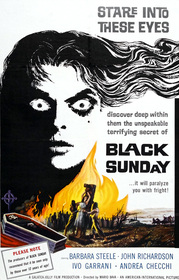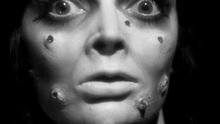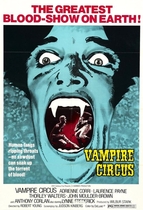Our editor-in-chief Nate Yapp is proud to have contributed to the new book Hidden Horror: A Celebration of 101 Underrated and Overlooked Fright Flicks, edited by Aaron Christensen. Another contributors include Anthony Timpone, B.J. Colangelo, Dave Alexander, Classic-Horror.com's own Robert C. Ring and John W. Bowen. Pick up a copy today from Amazon.com!
Black Sunday (1960)
Italian horror, that awkward pile of animal feces capped with 24-karat gold, owes quite a bit to Mario Bava. More specifically, it owes it to Bava's first solo directorial effort, La Maschera del Demonio, better known in the United States as Black Sunday. This macabre tale of atavistic revenge brings together the outlandish Gothic trappings of Universal's old chillers and the newer viscera of Hammer, along with a visual nuance that belongs entirely to Bava.
In the 17th Century, Princess Asa Vajda (Barbara Steele) and her lover Javuto (Arturo Dominici) are convicted of witchcraft and sentenced to death. Just before a horrific mask of Satan's likeness is nailed to her head, Asa swears vengeance on the lineage of the Grand Inquisitor, her brother. Two hundred years later, a pair of doctors accidentally unleash the witch and the vampiric Javuto, spelling doom for Vajda descendant Katya (also Steele)
All of that hardly matters, however. Terrible, obvious dubbing harms the effectiveness of the plot, as does the intrusive score by Roberto Nicolosi. This is not a film blessed with great sound design, and there's no subtitled Italian-language version widely available in the United States.
Black Sunday also shares one unfortunate aspect with its direct descendants -- inconsistent storytelling. It's been said that Bava was fond of radically altering the screenplay after filming had already begun. Indeed, editor Mario Serandrei gets a screenwriting credit for taking contradictory sequences and fitting them into a whole that gets from Point A to Point B while keeping audience confusion to a minimum. Steele would later report that she never saw the whole script at once. She received her lines the same day they were being filmed.
Bava's interest is in visual storytelling - he was a cinematographer before he was a director. In Bava's world of the morbid, bare tree branches (forests are always dead) form severe cobwebs that consume the screen, fog lightly treads across the hardened ground like a reluctant intruder, and the night sky is always cloudy and ominous.
Bava always keeps the concept of the dead at the forefront of the viewers' consciousness. The vampires (or witches, the film is never terribly explicit) are possessed of putrescent flesh, not the smooth lines of Bela Lugosi or Christopher Lee. Even before Asa begins wreaking her revenge, the Vajda castle seems like a tomb -- a tomb with a very good interior decorator, but a tomb.
As if to counterpoint the moribund motif, the camera tends to keep its watchful lens on the unusual beauty of Steele. With her pinched features, Steele isn't an obvious choice for sex symbol, and yet her glassy stare and heaving bosom (and oh how it heaves) play a seduction dance that mesmerizes. Federico Fellini would later use Steele's strange allure to his own benefit in 8 1/2. One wonders if he didn't catch his first glimpse of her here.
If taken purely as a visual tour of the best kind of horrific fairy tale, with all the bizarre imagery therein, Black Sunday is a masterpiece and a cornerstone of Italian horror cinema. (not to mention a huge influence on American directors like Tim Burton). Putting too much emphasis on the sub-par audio elements and poor dubbing (the fault of the American distributors rather than the filmmakers themselves) will hurt the film's overall effectiveness. Turn the volume low, open your eyes wide, and soak in Bava's beautiful nightmare.










Having seen this movie for
Having seen this movie for the first time I declare BLACK SUNDAY as the total celluloid masterpiece of the genre called horror